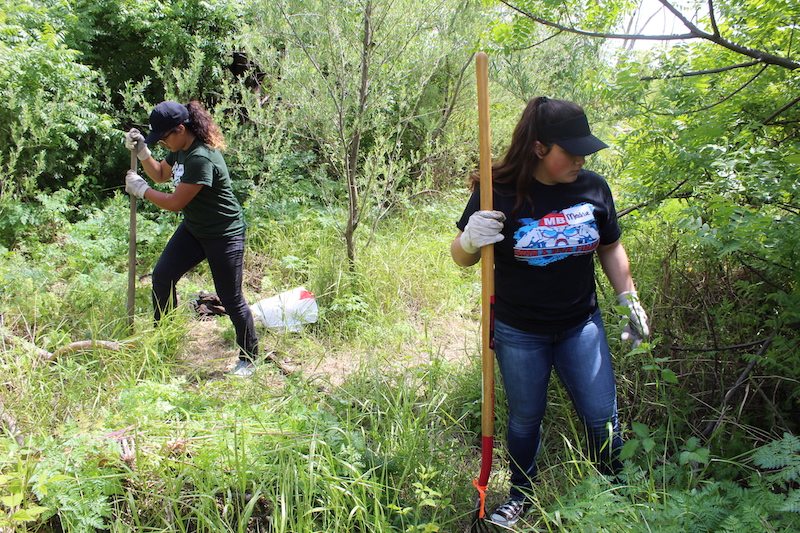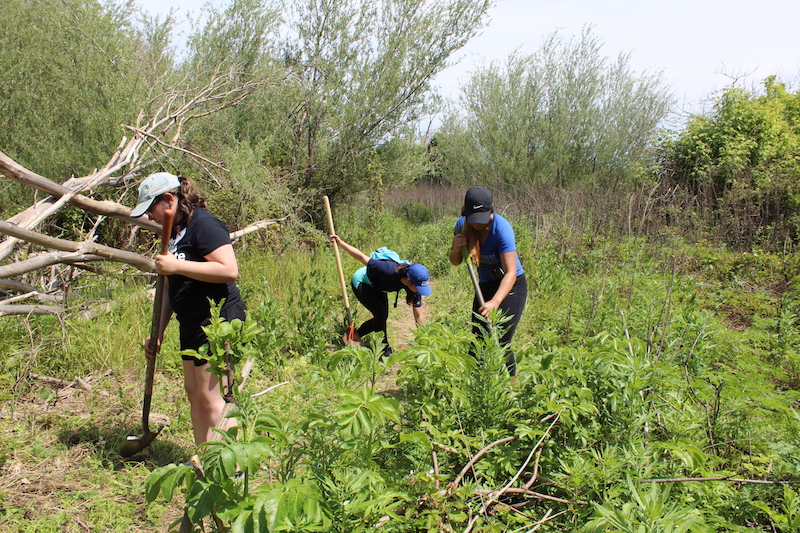Sacramento State professor works with students to restore Bushy Lake
Restoration project at Bushy Lake adds to 4 years work
Corina Gutierrez – The State Hornet
Sacramento State roommates Sarai Bustos (left) and Maddie Hiura work together on helping to restore the pathway to Bushy Lake on Earth Day, April 22, 2018.
April 23, 2018
Sacramento State students participated in the celebration of Earth Day by tending to Bushy Lake, located behind Cal Expo.
Sac State environmental studies professor Michelle Stevens said she has been actively working to restore the wetlands and habitat surrounding Bushy Lake for four years.
RELATED: Sac State wildlife restoration project near Cal Expo unveiled after being threatened by fire
Sac State student William Ortega said Bushy Lake is a riparian zone, of which there are not many left in California.
“We’re trying to restore the remaining ones we have,” Ortega said, “It’s important we have this one that goes into the American River.”
Bushy Lake flooded last year and water could start flooding other areas, creating more damage, if it isn’t fixed, according to Ortega.
Another Sac State student, Yvette Hernandez, said the event this year focused on the regional waterscape and saving turtles.
“This is my first time being here just because I am new to the area,” Hernandez said. “I’m just trying to get involved and do these environmental things to help the community.”
Red-eared slider turtles and western pond turtles are both present at Bushy Lake and are in competition with each other, according to Stevens.
Stevens said the area is home to birds, deer, turtles, coyotes, skunks, raccoons and other wildlife that move between the lake and the American River.
“We’ve been monitoring the turtles and seeing how they’re doing,” Stevens said.
Stevens said workers from the California Department of Fish and Wildlife told her they could help trap the red-eared sliders but would have to euthanize them.
“I’m Native American and my medicine animal is (a) turtle; I’ve seen turtles everywhere in the world and I could not kill turtles, I just couldn’t do it,” Stevens said. “My students kept doing exceptional research and they just kept finding more and more that these red-eared sliders are really a problem.”
Sac State student Melissa Garcia, said the group of students and volunteers do not want the red-eared sliders around because the animal takes over the territory, which makes it difficult for the western pond turtles to survive.
“We’re trying to figure out ways to not have them overrun this area,” Garcia said.
Sac State student Elizabeth Luke said the group is working in conjunction with UC Davis and CDFW to remove the red-eared sliders.
Luke found a wildlife supporter who is willing to help find homes for the red-eared sliders so they can start on the turtle research, which Stevens said “is really neat.”
Aside from monitoring the turtles, Stevens, her students and volunteers, work hard to restore the vegetation and remove weeds near Bushy Lake.
“What we do is come up with our own experimental designs and see what kind of plants survive better here. We plant native species, which are usually drought resilient and fire-resistant,” Garcia said. “There’s a lot of cool species that hang out around here.”
Ortega said he removed some of the invasive species like poison hemlock and is trying to re-introduce species that were lost, along with adding new ones to help other plants thrive better.
“Lewisia is another plant that we’re trying to bring back with one of our projects, Mugwort too, it’s called companion planting,” Ortega said.
Stevens said their research is part of an overall effort with Sac State to do high impact work.
“I looked for a project along the American River that I could involve students on that would be our project,” Stevens said.
Stevens said she would like to see other faculty use Bushy Lake and work with her on the research, since it is difficult for just one person to keep it going.
“I’m hoping to find an organization that we can be part of that will help us, like the Mugwort is for other plants, to help us have more administration,” Stevens said.























































































































